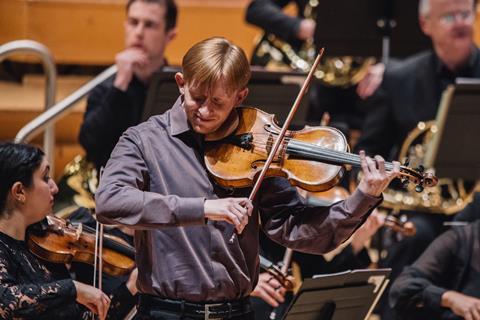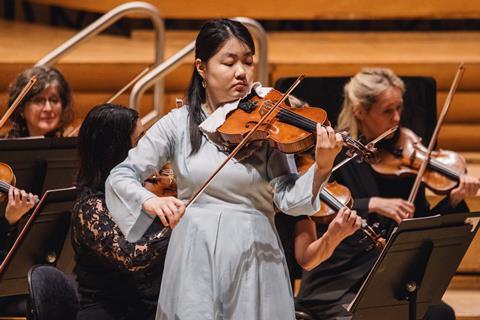Tully Potter attended the 2025 editions of the Tertis and Aronowitz International Viola Competitions – held for the first time under one roof in the north-east of England – and he couldn’t fault the results

Discover more Featured Stories like this in The Strad Playing Hub.
Read more premium content for subscribers here
Gateshead in January does not immediately sound inviting, but that was the place and time for the 14th Lionel Tertis International Viola Competition, a welcome resuscitation after the 2022 event was scuppered by the Covid scourge.
Impressions crowded in on me. Every hotel room seemed to contain a practising violist. What? No black pudding for breakfast? In the north-east? The venue, now named the Glasshouse (International Centre for Music), though locals still obstinately call it the Sage, is in a terrific position – fronting on to the River Tyne, with Newcastle on the far bank – but seems very isolated.
A vast, striking Norman Foster building, the Glasshouse has a huge atrium incorporating a café area where friends and colleagues can meet and chat. The lift system is even more Byzantine than that at London’s Barbican, but the numerous performing spaces are excellent apart from much of the seating – inhospitable to anyone with long legs.
The week (19 to 25 January 2025) was a huge success, despite the threat of being blown away by the icy blasts of Storm Éowyn, and we experienced quite a few ‘firsts’. For the first time the Cecil Aronowitz International Viola Competition – a particular baby of organiser Louise Lansdown, who plays Aronowitz’s old instrument (thought to have been made in Paris c.1750) – was combined with the Tertis, and the age ranges were adjusted: Tertis, 19 to 30; Aronowitz, 18 or younger.
Having been involved in all the previous Tertis competitions, held in Port Erin on the Isle of Man from 1980, I found myself for the first time totally agreeing with the jury’s decisions. It was my Aronowitz baptism, but again I could not fault the results. We ended up with two splendid winners: 24-year-old Samuel Rosenthal, a Juilliard School graduate studying in Germany with Nobuko Imai, and 17-year-old Xunyu Zhou, formerly at the Shanghai Conservatory of Music and now studying with Tabea Zimmermann in Frankfurt.

With an exhibition by luthiers on the atrium balcony, tables devoted to strings and accessories, masterclasses, lectures, workshops and the Glasshouse’s normal musical activities for children, the building was humming. The atrium rang with familiar snatches of music as new violas were tried out. Dr Lansdown was here, there and everywhere, cajoling, encouraging and troubleshooting – and putting a brave face on, following an unsuccessful bid to Arts Council England for funding the event. The Tertis Foundation, which did provide support, was represented by Cathy Connolly; and Lansdown’s fellow artistic directors, Sarah-Jane Bradley (who gave an interesting talk on York Bowen’s music for Tertis) and Martin Outram, were both in evidence.
The day-to-day running of the potentially chaotic goings-on was very friendly, with 22 viola students from the Royal Northern College of Music helping Nicky Footer and her fellow administrators. The Tertis jury had some heavy days, with 39 competitors to get through, but the Aronowitz panel had things relatively easy with 21. Faced with two competitions running concurrently, I had to take ‘Potter-luck’ on which sessions I attended, and it was sheer happenstance that I heard brilliant performances by both winners: a superb Paganini Caprice no.24 from Zhou and an exciting recital by Rosenthal, with Bax’s Viola Sonata and the first movement of Bowen’s Viola Concerto. When I thanked Rosenthal afterwards, he said, cheerfully: ‘We love British music in the States.’
We were treated to a recital each evening, and the bar was set high on Sunday by Timothy Ridout. His G major Bach Cello Suite was full of life, with the folk element brought out in the last movement; Caroline Shaw’s in manus tuas (2009), which he has recorded, was even more moving when heard live; and Bach’s D minor Partita was crowned by a triumphant Chaconne. On Monday I found Aronowitz juror Thomas Riebl’s 2011 five-string instrument by Bernd Hiller most convincing in Garth Knox’s Toccata for Thomas (premiered by Riebl in 2022); and I enjoyed Icelander Ásdís Valdimarsdóttir’s contributions, my first hearing of her playing as a soloist.
In the Tertis I found myself for the first time totally agreeing with the jury’s decisions
On Tuesday, Ridout went with pianist James Baillieu to Hartlepool Town Hall Theatre, in the town of Tertis’s birth, to give a lunchtime recital that apparently was very well received. That evening brought an enjoyable recital by Tertis jurors Françoise Gnéri, Lilli Maijala and Thomas Selditz, especially Maijala’s performance of Acequia madre (2012) by Magnus Lindberg and Sydänlaulu (‘Song of the Heart’, 2014) by Cecilia Damström. Highlight of the next evening’s recital by Ridout and Hélène Clément (standing in for Imai, who was indisposed owing to illness) was Rolla’s F major Duo. Valdimarsdóttir was back on Thursday as one of those assisting Robin Ireland in Bach arrangements and his own compositions. Some of the competitors played on Friday – a nice idea.
The standard of piano playing was impressive, with Anthony Hewitt, Robert Markham and Sophia Rahman partnering the Tertis entrants, and Jennifer Carter and Charles Matthews sharing the Aronowitz workload.
I enjoyed Kathleen Tagg’s compulsory composition for the Aronowitz competition, Dual-ing (Cecil in Africa) (2024), while not really catching on to the African content, despite my South African background. Knox’s 2024 test-piece for the Tertis, The Bridges of Newcastle (The Broon Toon Tune), struck me as more durable, clearly portraying the Tyne flowing on its journey to the sea.

The two finals on Saturday were of a high standard. I was delighted to see a solid phalanx of women in the Royal Northern Sinfonia first violins and good representation in the seconds and violas, not to mention the two double bassists. The results of both competitions were announced after the second final, and while we waited we were entertained by non-finalists playing viola ensemble music, rehearsed and directed by Robin Ireland.
All three Aronowitz finalists were required to play Britten’s Lachrymae, as well as the opening movement of either the Hoffmeister or the Stamitz concerto. Zhou, who played Hoffmeister, was clearly the best and won £5,000 as well as a raft of other prizes. Jaeyun Han, 14, from South Korea took £3,000 for second place and £1,000 for the best Tagg performance; and 17-year-old Jackson Hill (US/Canada) received £2,000 for third place.
In the evening, Rosenthal triumphed with a barnstorming Bowen Concerto; he received £5,000, the chance to make a debut album with Champs Hill Records and a Hartlepool recital date. Nicolas Garrigues, 25, from France took the £3,000 second prize with his committed Bartók Concerto; and Ami-Louise Johnsson, 24, from Sweden received £2,000 for her Walton. American Rebecca Benjamin, 20, best performer of the Knox, took £1,000; the £1,000 John White Award went to 23-year-old Wanxinyi Huang from China; and the £250 Karl Doktor Prize was awarded to 20-year-old Stephen Savage (US).
London viola fanciers can hear Rosenthal and Zhou in a shared Wigmore Hall recital on 3 October 2025. I intend to be there.
Read: Results announced for the 2025 Tertis and Aronowitz International Viola Competitions
Read: Postcard from Hanover: Joseph Joachim Violin Competition
Discover more Featured Stories like this in The Strad Playing Hub.
Read more premium content for subscribers here
The number one source for playing and teaching books, guides, CDs, calendars and back issues of the magazine.
In The Best of Technique you’ll discover the top playing tips of the world’s leading string players and teachers. It’s packed full of exercises for students, plus examples from the standard repertoire to show you how to integrate the technique into your playing.
The Strad’s Masterclass series brings together the finest string players with some of the greatest string works ever written. Always one of our most popular sections, Masterclass has been an invaluable aid to aspiring soloists, chamber musicians and string teachers since the 1990s.
The Canada Council of the Arts’ Musical Instrument Bank is 40 years old in 2025. This year’s calendar celebrates some its treasures, including four instruments by Antonio Stradivari and priceless works by Montagnana, Gagliano, Pressenda and David Tecchler.






































No comments yet